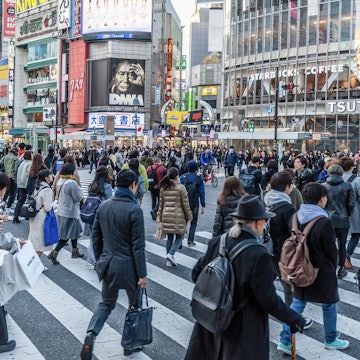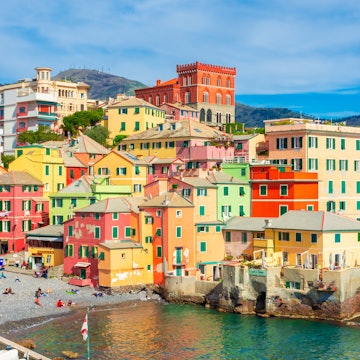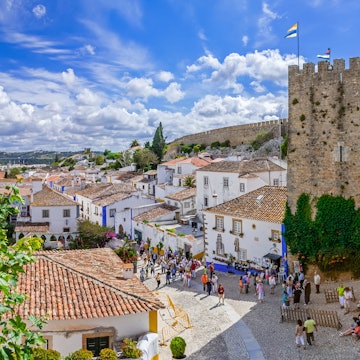
Meet a Traveller: Katie Boue of the Outdoor Advocacy Project

Dec 30, 2019 • 8 min read

Boue and her team are inspired by their own attempts to enjoy the great outdoors while leaving no trace © Brody Leven / Lonely Planet
Katie Boué isn’t the perfect “outdoorist.” And she knows you’re probably not, either.
Scrolling through the photos on her Instagram feed might give you the notion of outdoorsy perfection, with her curated stream of desert sunsets, dirt roads, and hikes with her very cute dog, Spaghetti. But if you read the captions and follow her stories, you’ll see Katie isn’t simply sharing big smiles and stunning, wild landscapes. She’s encouraging others to join her in working to protect these places from the many threats they face — including ourselves.
These days there’s a lot to be worried about if you love the outdoors. From climate change and fossil fuel extraction, to overuse and a lack of education on responsible recreation, it’s easy to get swept up in frustration and fear. And while some see Instagram as adding to the strain of overcrowding and commodifying the outdoors, Katie sees an opportunity.
She believes this enormous community of people who love to go outside could have an even more enormous power to protect and fight for these places if they’re simply provided with the knowledge and resources to do so.
The Outdoor Advocacy Project, which Katie and her team launched last week, aims to privide those resources. None of us can ever be perfect examples of adventurous outdoorists – the kind of mythic advocate who produces zero waste and lobbies against fossil fuel development on public lands, all while hiking and camping and leaving no trace and educating others on the ecological significance of cryptobiotic soil – but Katie hopes the Outdoor Advocacy Project will help everyone be a little better at all of those things more often than not.

We spoke to Katie about all the work that’s gone into this project and how she hopes the outdoor community will use it:
When did you first have the idea for the Outdoor Advocacy Project, and how has it evolved since then?
Just recently I was updating my LinkedIn profile, and I found this fundraiser page that I created ages ago when I was traveling and climbing all over the country. I raised $1200, which was probably all from my mom. But I read the introduction I’d written for that, and it was all the same stuff I’ve been talking about with the Outdoor Advocacy Project.
I was like, “Dang, Katie! You’ve been on this path all along!”
I am so inspired by public lands and seeing people give back to these places through stewardship. During my time at the Outdoor Industry Association, I realized how much focus we give to outdoor businesses and the industry at large. But there’s no real cohesive, representation for the people in the community — the consumers. There’s an 887 billion dollar outdoor industry — that’s measuring people. And who’s speaking for those people who love the outdoors?
The idea for Outdoor Advocacy Project has taken many forms. But I finally quit my job back in April and decided to focus on this idea full-time.

What is the Outdoor Advocacy Project?
I wanted to create a platform for the community to gather and get informed and then take action. Our community is incredibly powerful — but you’re probably not going to take that action unless you feel empowered.
All of these resources already exist. They’re just buried in nonprofits’ websites from 1995 or a campaign someone did three years ago.
Ultimately, Outdoor Advocacy Project is a funnel. I don’t want this to be the end-all-be-all. You take the first step here. Maybe it helps you connect with a local conservation community in your backyard. I want it to be the first step, and then you find yourself lobbying for public lands in D.C.
So where and how should people take the first step through this resource?
That’s the question: Where do you start?
We launched with about 20 articles on outdoor advocacy. The goal is to create a huge resource. Wherever you want to start, we have the steps, and we will have the resources. We’re developing one right now on how to get started in outdoor advocacy. It’s a massive topic but I really believe in my team.
The people who will find and use the Outdoor Advocacy Project are probably the people who want to treat the outdoors well when they travel and spend time in these places. Anyone can use this resource to learn more, but how do you reach people who don’t know the basics, and might not be looking for this kind of information? Or they’re just not interested?
We’re all butting heads in so many places. Everything is a little messy right now. I think the answer is that we have to build relationships — that’s so key to me.
I want to offer the antidote to “call-out culture” in the outdoors. Instead, I want to call people in. The only way you’re going to change someone’s mind or their behavior is if you have a relationship with them.
And you have to meet people where they’re at. Maybe an average user at a state park doesn’t even have the words “outdoor advocacy” on their radar. You have to see them and speak to them.
Part of my grander vision for the Outdoor Advocacy Project is an ethical marketing agency. We take these resources and partner with people on the ground, like a state park, for instance. Outdoor Advocacy Project could partner with a state park in Kentucky, and then partner with local businesses around there; you partner with the local pizza place, you build community. Then you can talk about protecting the outdoors.

What’s your favorite state park?
I just went to Anza-Borrego Desert State Park in California, and I loved it. Hueco Tanks is great for climbing and it’s also one of my favorites.
You obviously spend a lot of time in the outdoors, but is there one outdoor memory that’s particularly special to you?
This is going to sound cheesy, but whatever — the one that comes to mind is the last time my boyfriend and I went camping in our old van. We used to have a Delica, and it was a total junker. We actually just sold it and brought a new 4x4 Sprinter.
But we used to go camping in the Delica with our dog, Spaghetti. It just had a twin bed and that is not enough sleeping space for us. But in the morning when we would wake up to those desert sunrises, the three of us all warm and cozy, sleeping out on these public lands with no one else around—those moments were really special.
I’ve cultivated this deep sense of belonging to public lands, in stewardship for public lands, particularly in Southern Utah. I cry every time I’m out there, and I’m like, “Katie, get a grip.” But it’s just really special.
How has your own relationship with the outdoors changed since starting the Outdoor Advocacy Project?
It’s shown me that I am always learning. The greatest thing about this project is that it will humble me, challenge me, and put me in my place as a student. I’m very much looking forward to that.
Honestly, trying to encompass the entire idea of outdoor advocacy is pretty audacious. It’s been a lot. So I haven’t really gone outside in a few months.

What’s been the biggest hurdle to getting this project out into the world?
I think the biggest hurdle has been myself. Until I hired my assistant, I was not capable of getting this done on my own — and I thought I had to do it all on my own. This is totally self-funded but I needed a team. We’re developing a website and we’re developing a curriculum. We need social media content. We need a lawyer. And I was trying to do it all on my own.
Maryn, my assistant, is my rock. And these two women, Chiara Forrester and Savannah Adkins Croft, have been instrumental. Savannah is a student at Utah State University, in Logan — she reached out and wanted to help by writing science content. She ended up organizing over a dozen student scientists who are developing content around forests, ecology, animals — all this stuff I needed help with. It wasn’t intentional but this project was powered by all women, which is pretty great. This team pushed me – they believe in what’s happening here. Chiara woke up at 3am to fly to Salt Lake City from Boulder, to be here for the launch. I cried when I learned she came here just for this.

Now that you’ve launched, what’s next for the Outdoor Advocacy Project?
The next step is funding support and partnerships. I want to be working and aligning with outdoor organizations and brands who are walking the walk and talking the talk. I want people to see who is stepping up. I’m excited to bring the rest of the outdoor community up with me.
We have a ton of content coming. Our library is huge and it’s going to grow. We’re hopefully hosting webinars. We’ll have sign-on letters for outdoor issues.
I’ve seen a huge gap between consumers and the brands and lawmakers. We need to be holding them accountable, and telling them directly what we want as an outdoor community — and we’re going to make that easier.
What’s the most common question you’ve been getting about the Outdoor Advocacy Project?
Everyone wants to know how to get involved and how to help. I have over 150 messages in my inbox from people offering photography and copywriting and legal help.
So now there’s a form on the website for people who want to get involved, and I highly encourage everyone to sign up there. We’re compiling all of these people and their skills in a spreadsheet so we can directly reach out. Oh, we need a photographer in Alaska? We know who to go to.













